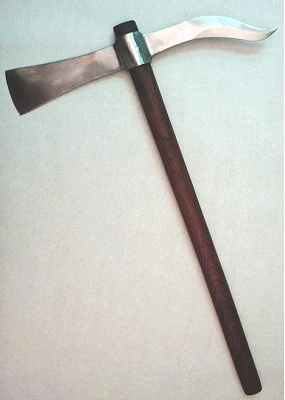Tigerman0044 (talk | contribs) (Adding categories) Tag: categoryselect |
(→Uses) |
||
| (5 intermediate revisions by 2 users not shown) | |||
| Line 5: | Line 5: | ||
==Uses== |
==Uses== |
||
| − | "This was made to go through rock. This is just an |
+ | "This was made to go through rock. This is just an afterthought." Roman Centurion Expert |
The dolabra was used in excavations and mines, as a priest's implement for religious animal sacrifices, and was used as an [[E-Tool|entrenching tool]] by the Roman legions. However, it was useful as an improvised weapon if the user was attacked and could not reach his usual weapons. The weight of the weapon combined with the force of a swing concentrated on the sharp pick could inflict serious, often fatal injuries. |
The dolabra was used in excavations and mines, as a priest's implement for religious animal sacrifices, and was used as an [[E-Tool|entrenching tool]] by the Roman legions. However, it was useful as an improvised weapon if the user was attacked and could not reach his usual weapons. The weight of the weapon combined with the force of a swing concentrated on the sharp pick could inflict serious, often fatal injuries. |
||
| Line 11: | Line 11: | ||
Since axes are easier to mass-produce than swords, dolabras were used by every soldier while the gladius was used by the legionares. |
Since axes are easier to mass-produce than swords, dolabras were used by every soldier while the gladius was used by the legionares. |
||
| − | Since the Roman soldiers were combat engineers as much as (if not more than) they were warriors, it is likely they used this tool more often than any weapon. They would chop down trees to build forts. |
+ | Since the Roman soldiers were combat engineers as much as (if not more than) they were warriors, it is likely they used this tool more often than any weapon. They would chop down trees to build outposts, forts, roads, boardwalks and bridges to maintain logistics for armies across long distances. Every centurion had 100 units, but only 80 were legionaries; 20 were servants, some of whom were specialized professional engineers. |
| + | |||
| + | Julius Caesar constructed trenches in multiple battles in order to besiege an enemy army while simultaneously maintaining a strong defensive position. The Battle of Alesia saw Caesar make two layers of fortifications between himself and the city of Alesia, and himself and the Gallic reinforcements approaching the city from abroad. |
||
In the middle ages pickaxes were used as mining tools and served as improvised weapons on occasions. |
In the middle ages pickaxes were used as mining tools and served as improvised weapons on occasions. |
||
Revision as of 12:22, 14 March 2020

The Dolabra is a versatile tool used in Italy since ancient times. It was the Special Weapon of the Roman Centurion.
Description
The dolabra was similar to a modern pickaxe. It had a broad axe head on one side of the handle and a pick on the other.
Uses
"This was made to go through rock. This is just an afterthought." Roman Centurion Expert
The dolabra was used in excavations and mines, as a priest's implement for religious animal sacrifices, and was used as an entrenching tool by the Roman legions. However, it was useful as an improvised weapon if the user was attacked and could not reach his usual weapons. The weight of the weapon combined with the force of a swing concentrated on the sharp pick could inflict serious, often fatal injuries.
Since axes are easier to mass-produce than swords, dolabras were used by every soldier while the gladius was used by the legionares.
Since the Roman soldiers were combat engineers as much as (if not more than) they were warriors, it is likely they used this tool more often than any weapon. They would chop down trees to build outposts, forts, roads, boardwalks and bridges to maintain logistics for armies across long distances. Every centurion had 100 units, but only 80 were legionaries; 20 were servants, some of whom were specialized professional engineers.
Julius Caesar constructed trenches in multiple battles in order to besiege an enemy army while simultaneously maintaining a strong defensive position. The Battle of Alesia saw Caesar make two layers of fortifications between himself and the city of Alesia, and himself and the Gallic reinforcements approaching the city from abroad.
In the middle ages pickaxes were used as mining tools and served as improvised weapons on occasions.